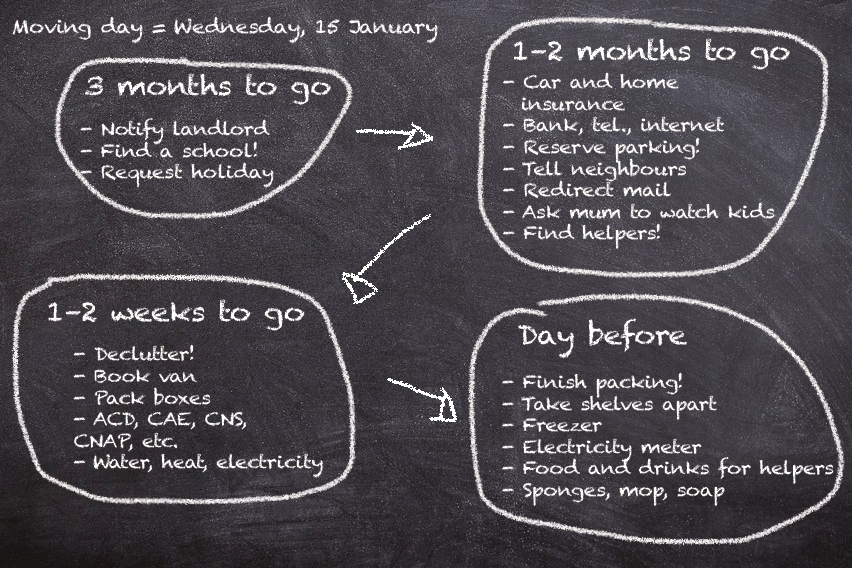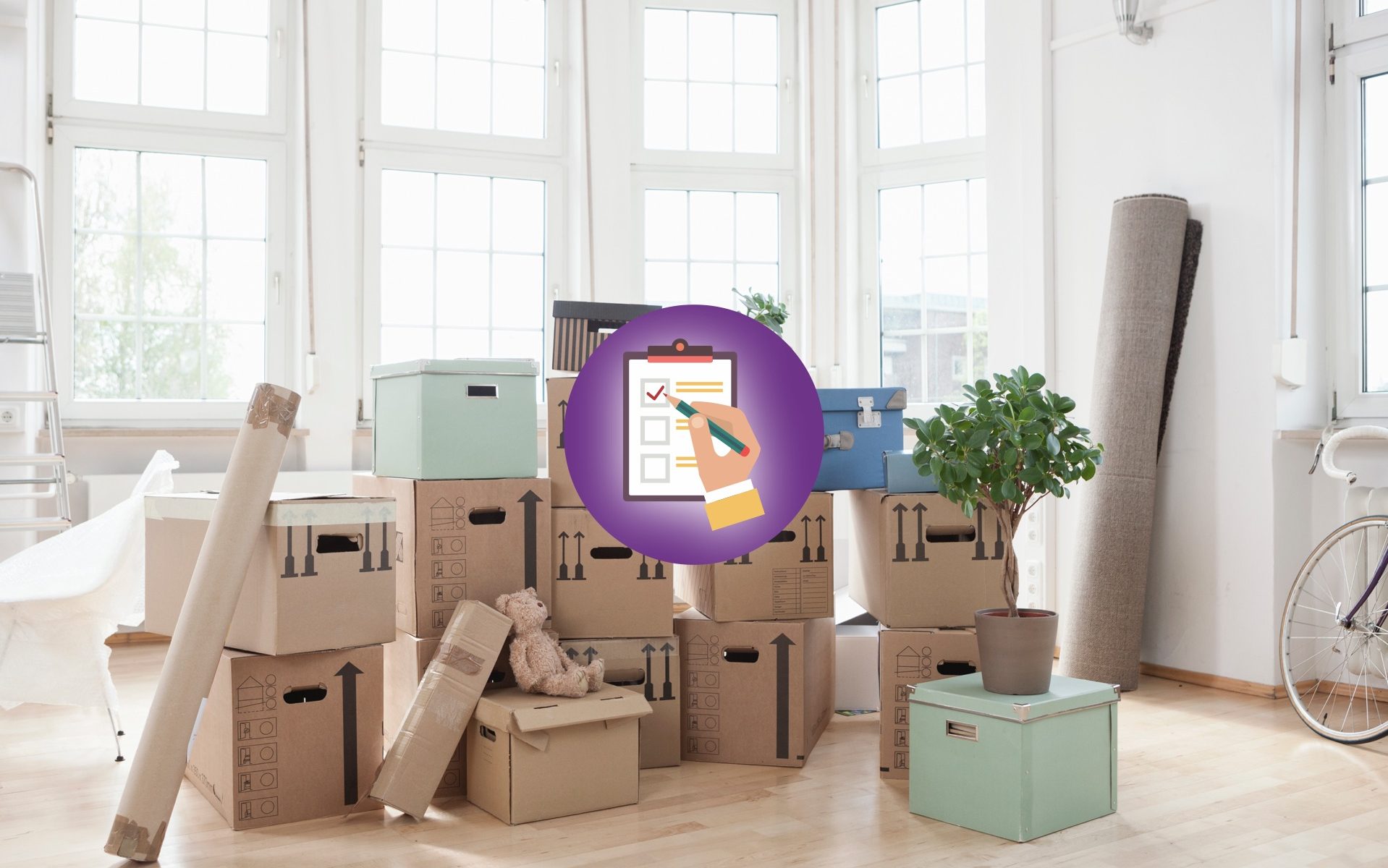Your to-do list for moving house
After months of searching, you’ve finally found your dream home. You have all the paperwork in order and you’re about ready to put your feet up. But there’s one thing left… You still have to move! To make this daunting task a little easier, myLIFE has put together a handy list of things to consider when getting organised. Stick to it, and you can settle in without a care in the world. We promise!
The whens and hows of moving out
Moving day is no time for improvisation. Plan ahead and begin preparing for your move at least three months in advance, or you may be in for some unpleasant surprises. You can start by asking yourself these three questions:
1. When is the best time for you to move?
If possible, try to avoid school breaks, the summer holidays and the end of the year. Moving companies are in high demand during these periods, and prices tend to rise. Instead, pick a time at the beginning of the year (from January to March) or from late September to early December, on a weekday if possible.
2. Are you required to give notice?
If you rent your home, you will have to inform your landlord that you’re leaving. Normally, this must be done three months in advance (although some leases may stipulate a longer notice period). Take the time to check, or you might find yourself paying rent even after you leave!
3. Will you need to use a moving company?
Using a professional moving company will save you time and energy, and will mean your belongings are insured if any damage is done. But the cost of this service can vary wildly depending on the amount of things you have to move, the date you select and the scope of what you want done (packing and unpacking included, transportation only, etc.).
Once you’ve answered these three questions, it’s time to put your plan into action. Boxes at the ready!
In Luxembourg, you are entitled to two days of extraordinary leave when you move, which can only be taken at that time.
3 months before the move
> Notify your landlord or real estate agency
To successfully end your lease, you must write to your landlord or the agency responsible for your home, sending the letter by registered post with proof of receipt.
-
- Use this opportunity to suggest a date for handing over your keys after you have completed the final inspection, after which you can get your rental deposit back.
> Notify your children’s school
Be sure to contact the school that your children currently attend. If they will have to switch schools, you will need to enrol them at the new one, too.
-
- If you’re coming from another country, you should know that education in Luxembourg is multilingual, and that there are special programmes in place to help children adapt.
> Notify your employer
Inform your employer of your new address and put in a request for your moving leave.
-
- In Luxembourg, you are entitled to two days of extraordinary leave when you move, which can only be taken at that time.
If you choose to use professional movers, get quotes from several different companies. Starting early means you’ll be able to choose the best price and level of service for your needs.
1–2 months before the move
> Sort through your belongings
Moving house is an excellent time to go through your belongings and get rid of anything you no longer use. There are many ways to declutter, whether you throw things away, sell them (through second-hand sites and shops, at a car boot sale, etc.) or donate them to charity.
> Choose your moving company or book a moving van
If you choose to use professional movers, get quotes from several different companies. Starting early means you’ll be able to choose the best price and level of service for your needs.
-
- Don’t forget to declare the value of your goods with the chosen company to guarantee proper coverage under their insurance.
If, however, you choose to organise the move yourself, research rental prices for moving vans and book yours in good time, or there may be none available on the day you want.
-
- There are many websites where you can estimate the size of van you need based on how much you have to transport.
> Start packing boxes
Pack up the first boxes with things you don’t use every day. Remember to protect fragile items (with bubble wrap, special containers, etc.) and to write down the contents on each box as you proceed. And bear in mind that all these boxes will have to be moved, so don’t make them too heavy!
-
- You can get free cardboard boxes from supermarkets, or buy them from big retail stores, hardware stores or online.
> Change your address with all State authorities and related service providers
Inform all State and other agencies of your new address (for example: the ACD, the CNS, the CAE, the CNAP, any other health insurance provider you may have, and the ADEM if you’re unemployed).
You should also contact the utilities companies that provide your water (by writing to your old municipality), heat and electricity to make sure these will be hooked up at your new abode.
-
- Provide the exact moving-out date so that your utilities aren’t cut off before you leave!
Make sure your new home will be properly insured as of your moving-in date.
1–2 weeks before the move
> Change your address with your bank, other insurance providers, and your telephone and internet providers.
As moving day draws near, it will be time to inform your bank and potentially switch to a local branch closer to your new home. You should also contact your telephone and internet providers to arrange your change of address (or set up a new connection). Finally, notify the insurance providers for your home and car, too.
-
- Make sure your new home will be properly insured as of your moving-in date.
> Reserve parking for your moving van
If parking isn’t readily available outside your new address, contact the municipal authorities to reserve a parking space for your moving van.
> Review the rules of your building and notify your neighbours
Check the rules for moving house set by the owners’ association (some may not allow the use of a moving lift, for example). And remember to give your neighbours advance warning of the noise and disturbance.
> Redirect your mail
Contact the Luxembourg postal service to change your address and set up mail redirection.
-
- Remember to change the address for any newspaper and magazine subscriptions you have as well.
> Arrange for childcare and petsitting
Moving day is going to be busy and stressful. Avoid needing to keep an eye on your kids (and having your furry friends get underfoot) by finding someone else to look after them.
> Rally your troops
If you’re managing the move yourself, you’re going to need a little help. If you haven’t already done so, now is the time to call upon friends and family to lend a hand on the big day.
Gather your valuables and important documents and put them in a safe place. Heaven forbid they should go missing during your move!
The day before the move
> Make the final preparations
Moving day is nigh, and it’s time to tape up last few boxes, disassemble the bulkiest furniture (and take photos as you go so you can put it back together!), defrost the freezer, and read your gas and electricity meters.
-
- Gather your valuables and important documents (like your passport and the deed to your home) and put them in a safe place, or even in a safe. Heaven forbid they should go missing during your move!
You should also remember to provide cold drinks and other refreshments for your helpers. Keep a few cleaning products on hand so you can give your old house or flat a once-over before the final inspection.

And when you’re done?
Finally, the worst is over! But before you take a well-deserved rest, remember that there are still a few loose ends to tie up. Don’t forget to:
> Do the final inspection with your landlord and hand over your keys (if you haven’t already).
> Visit the office of your new municipality (commune) within 8 days to declare your move.
-
- While you’re there, request your resident parking permit, register on the electoral rolls, update your ID (if you’re Luxembourgish) and declare your dog if you have one.
> Within one month, notify the SNCA (National Society of Automotive Traffic) to update your registration certificate (grey card).
-
- If you’re moving from another country, you’re required to register your vehicle within six months of arriving in Luxembourg.
Now you can finally relax and enjoy your new home sweet home… that is, until it’s time to plan the housewarming party!


 Mortgage
Mortgage Personal loan
Personal loan Savings
Savings